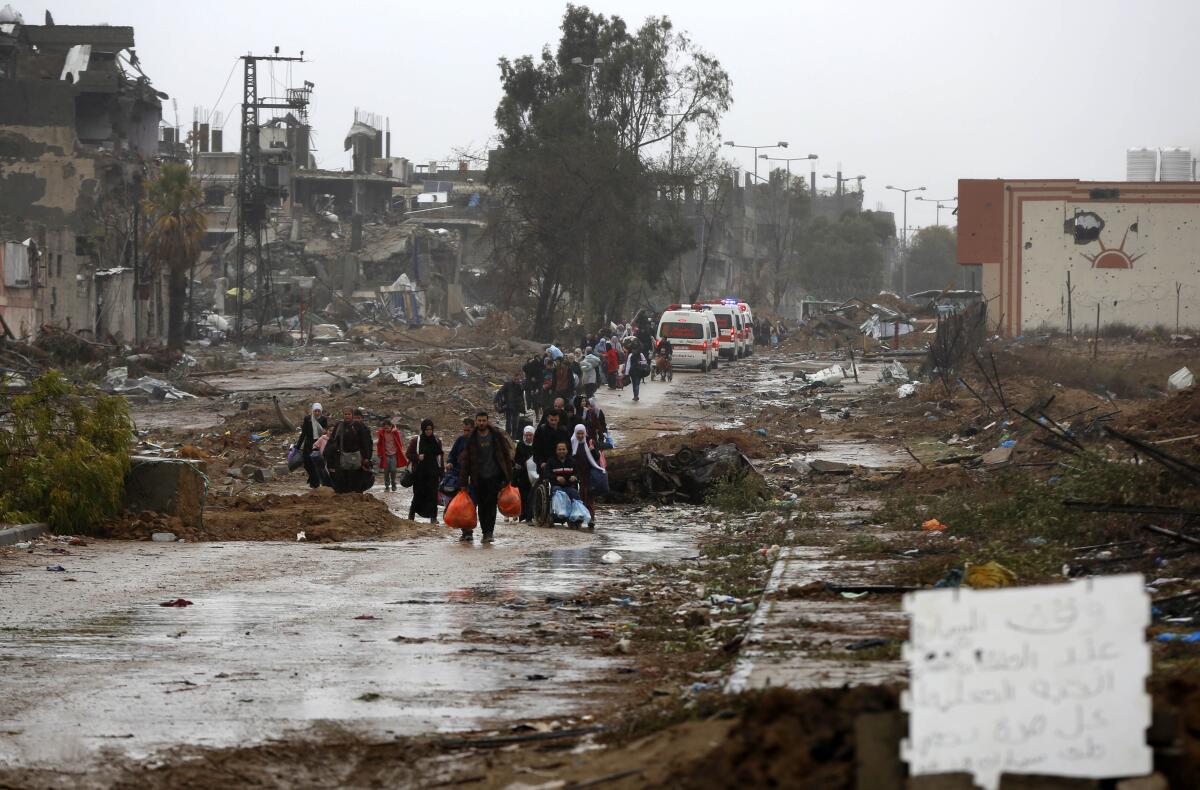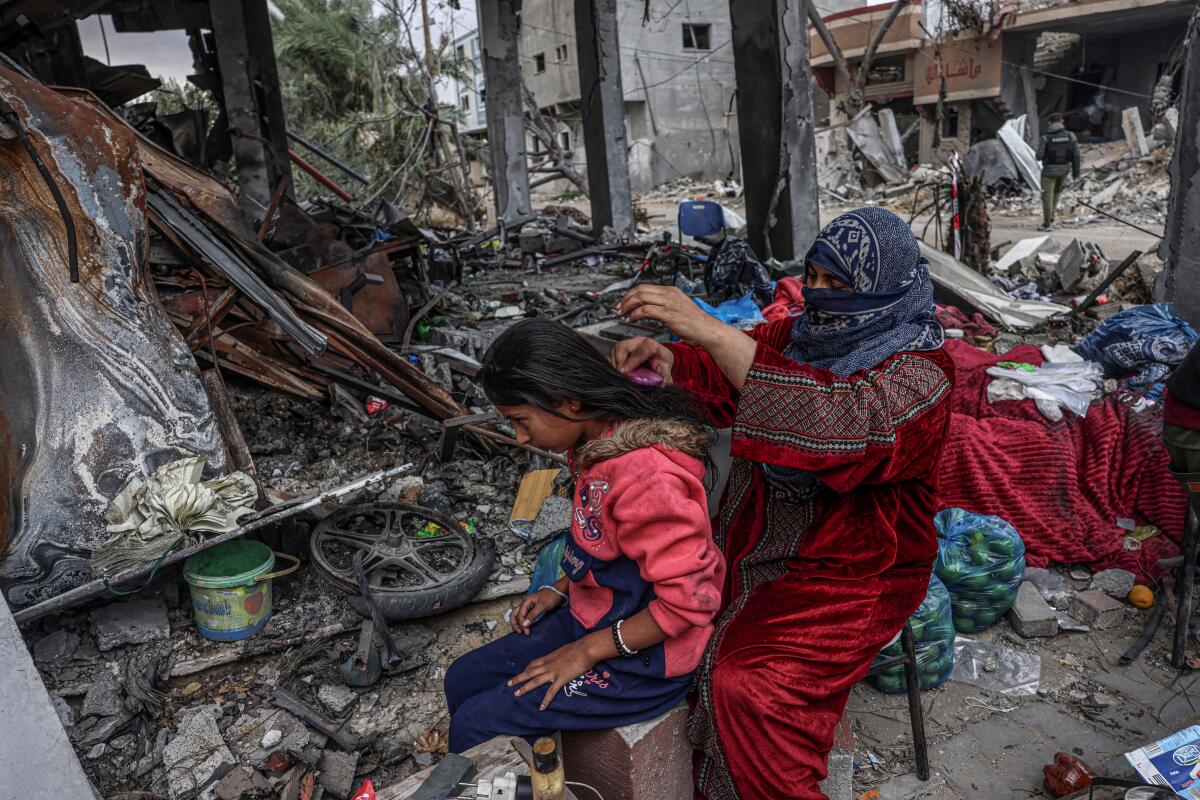
DEIR AL BALAH, Gaza Strip — She was born at dawn in a crowded shelter here on the first day of the truce between Israel and Hamas. Her parents named her Israa — just like her mother.
“Her arrival was an omen of peace,” said Israa abu Aaser, cradling her newborn. “There was quiet and no bombings.”
The family has been living in a corner of the shelter, their apartment razed by bombs like so much else in the Gaza Strip. Bilal abu Aaser had spent all day cobbling together scraps of wood to make a crib for his 3-day-old daughter.
“The cold and the hunger made her cry all the time,” he said. “I had to do something.”
“I’m afraid for my daughter in a place like this,” said his wife. “I can barely keep her clean and warm.”

Palestinians fleeing south from the northern Gaza Strip take a safe-passage corridor designated by the Israeli army on
Nov. 27, 2023.
(Ashraf Amra / Anadolu via Getty Images)
It was early Monday, the final day of the deal to pause the fighting. The new parents wondered how they would care for their child if in 24 hours the bombardment started anew.
“I hope they’ll extend this truce,” Israa abu Aaser said.
She got her wish, at least for a bit longer. On Monday evening, after intense mediation efforts by Qatar and Egypt, the militant group Hamas announced a two-day extension of the agreement.
That is expected to result in the release of more hostages who were kidnapped from Israel by Hamas on Oct. 7 and Palestinian women and teenagers who are being held in Israeli prisons. Since the truce began Friday, roughly a quarter of the 240 hostages have been freed in exchange for more than 100 Palestinians.
For people in Gaza, it was a reprieve from the relentless Israeli military campaign that local health authorities said has killed more than 13,300 people.
As aid groups took advantage of the pause to ramp up humanitarian assistance, the 2.3 million people in Gaza took note of what they had lost and tried to stock up on water, food, fuel and other essentials.
Many prayed that the truce might be extended further and evolve into a more durable cease-fire.
“It has to hold,” said Tahani Haboush, 54, who was helping her husband while he underwent dialysis at Al Aqsa Martyrs Hospital in Deir al Balah.
In normal times, he visits the hospital three times a week for four-hour dialysis sessions. But with many medical facilities out of commission and medical supplies at a premium, the hospital could barely manage to put him on dialysis twice a week, two hours at a time.
“In past wars, it wasn’t like this,” Haboush said. “We had food and drink. We stayed in our homes. We need the truce to continue.”
For Ahmad Mughrabi, 42, the truce saved his right arm — at least for now. He was still in the hospital Monday recovering from surgery.
He, his wife and their four children were fleeing south from their Gaza City neighborhood this month when an Israeli tank fired a shell near him. One shard of shrapnel pierced his back while another drilled through the flesh of his arm and into the bone.
The family returned to their home, and for six days, they waited. By the time Mughrabi made it to the Shifa Hospital in Gaza City, his arm was rotting.
Lacking supplies, doctors there could do little more than dress his wounds and tell him to seek help elsewhere.
The situation wasn’t much better at Ahli Arab Hospital, where doctors urged him to go south and get an operation to save his arm. Relentless bombing meant he had to wait two more days. Al Aqsa Martyrs Hospital was only eight miles away, but he had to go on foot after being unable to find a ride.

A Palestinian woman brushes a girl’s hair in the village of Khuzaa, east of Khan Yunis, in the Gaza Strip on Nov. 27, 2023.
(Said Khatib/ AFP/Getty Images)
“The whole time I was walking, I kept wishing for a drop of water,” Mughrabi said. “That’s all I wanted. I was leaking blood.”
A surgeon installed a platinum bar to stabilize the bone.
Beside Mughrabi’s hospital bed stood his brother, 40-year-old Mohammad. The truce had given him an opportunity to visit from southern Gaza. He was unhappy about the level of medical care his brother was receiving.
Overwhelmed by a deluge of casualties, doctors could only manage to change his dressing every two or three days.
“His wound needs to be treated every day so we don’t end up with an infection,” the younger brother said.
It seemed to him that aid deliveries had done little to alleviate the lack of medical supplies. The same was true for food. An uncle outside Gaza recently sent him 200 Israeli shekels — roughly $53 — but it didn’t matter.
“There are things you can’t find at all, and if you find them they’re very expensive,” he said.
Across Gaza, people took what they could from the truce. For Mohammad Aloul, a freelance photographer, that meant finally visiting the cemetery.
On Nov. 4, two missiles landed at his door. He was out at the time, but when he returned, he learned that four of his sons, four of his siblings and three nephews were dead. His wife and another son suffered fractures and wounds all over their bodies.
Aloul, 36, found shelter at a relative’s house in the city of Rafah.
“I’ve spent days looking for water to wash and shower,” he said. “Oil, flour, bread, medicines for the injuries of my wife and son — nothing is available.”
It had been more than three weeks since his relatives were killed and buried. The bombardment had made the trek to the cemetery impossible until Monday.
He stood over the graves thinking about his sons — Ahmad was 13, Rahaf, 11; Kinan, 6; and Qays, 4 — and all the others he had lost.
“I’m alive but not alive,” he said. “My family is gone. All my friends are gone. For me the truce means nothing.”
Bulos reported from Jerusalem. A special correspondent, whom The Times is not naming, reported from Deir al Balah.
Don’t hesitate to reach out to us to discuss your specific needs. Our team is ready and eager to provide you with tailored solutions that align with your firm’s goals and enhance your digital marketing efforts. We look forward to helping you grow your law practice online.
Our Services:
Blog Post Writing
We do well-researched, timely, and engaging blog posts that resonate with your clientele, positioning you as a thought leader in your domain.
Content Writing
Beyond articles and content for blogs, we delve into comprehensive content pieces like eBooks, and case studies, tailored to showcase your expertise.
Website Content Writing: First impressions matter. Our content ensures your website reflects the professionalism, dedication, and expertise you bring to the table.
Social Media Management
In today’s interconnected world, your online presence extends to social platforms. We help you navigate this terrain, ensuring your voice is consistently represented and heard.
WordPress Website Maintenance
Your digital office should be as polished and functional as your physical one. We ensure your WordPress site remains updated, secure, and user-friendly.
For more information, ad placements in our attorney blog network, article requests, social media management, or listings on our top 10 attorney sites, reach out to us at canyoncrestguide@gmail.com.

